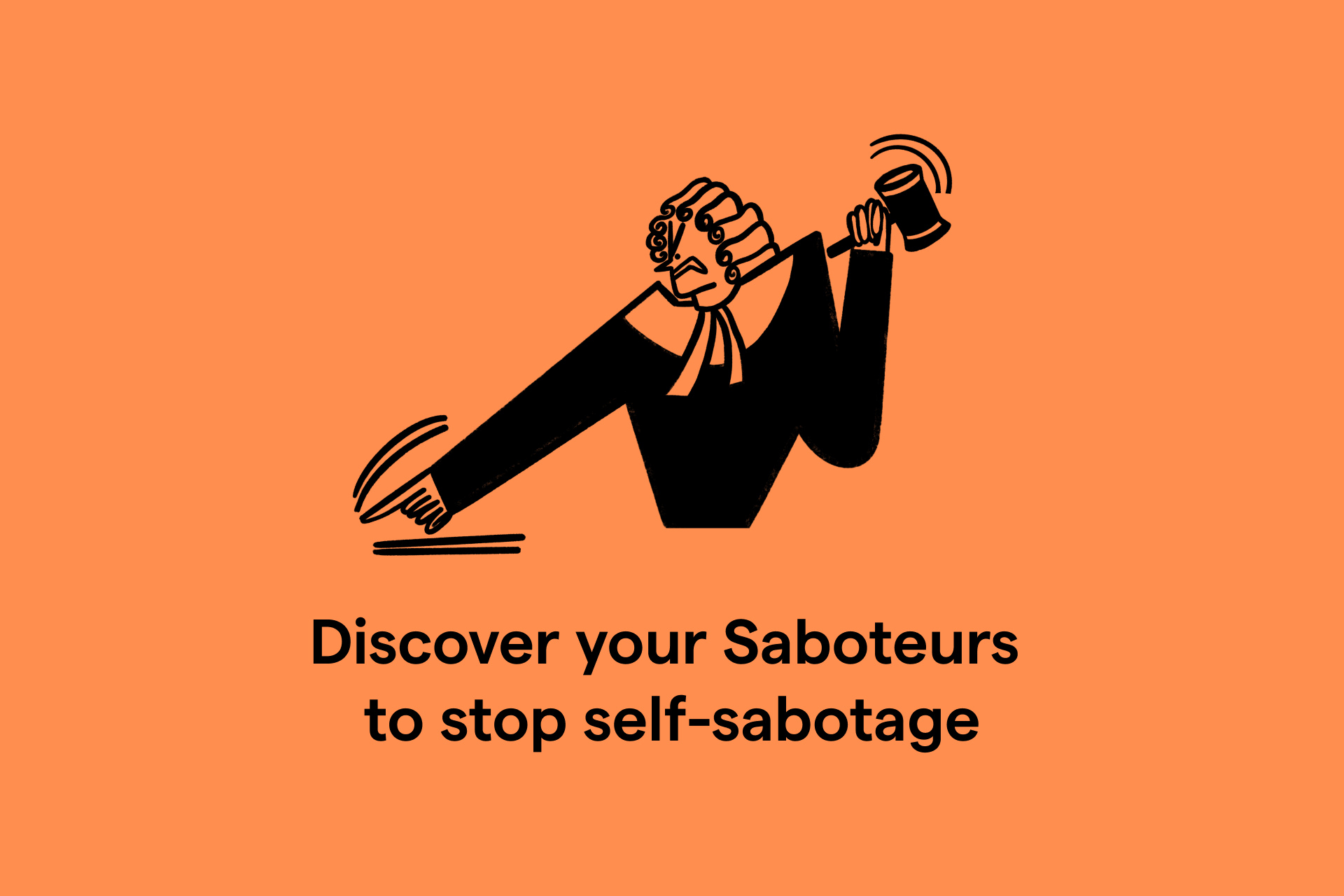
Individual
A self-facilitated program to boost your mental fitness for personal and professional growth
This website will offer limited functionality in this browser. We only support the recent versions of major browsers like Chrome, Firefox, Safari, and Edge.

Select the experience that fits your needs

A self-facilitated program to boost your mental fitness for personal and professional growth

A self-facilitated mental fitness program with exclusive pricing for 2 to 25 individuals

Explore coach-led mental fitness programs with workshops tailored to your organization
Mental Fitness

The biggest obstacle to personal and professional growth isn’t what’s happening around you. It’s what’s happening inside. Your inner Saboteurs quietly chip away at your confidence, creativity, and resilience.
Saboteurs are mental habits that hold you back. They show up as automatic thoughts, each with its own voice and set of beliefs that work against your best interests.
Everyone has Saboteurs. They’re part of being human. The real question isn’t whether you have them, but which ones — and how much influence they have over your thoughts and actions.
The good news is that you can weaken their hold. The first step is to spot them. When you uncover the lies and patterns behind your Saboteurs, you take away their power. It’s like creating a mental “mug shot” so you can recognize them in the moment and choose a better response.
Learning how to identify and intercept your Saboteurs helps you improve performance, build stronger relationships, boost your well-being, and lead with greater clarity.
And it all starts with understanding where your Saboteurs come from and how they show up in your life today.
Saboteurs begin as your early protectors. As a child, they help you deal with real or imagined threats to your physical and emotional safety. But by the time you’re an adult, you no longer need them, yet they still live in your mind, influencing how you think and act.
Your Saboteurs form patterns in your brain that become automatic over time. These mental habits get wired into your brain as neural pathways. When triggered, they take over. You feel, think, and react based on old, unhelpful patterns, often without realizing it.
There are ten common Saboteurs: Judge, Avoider, Controller, Hyper-Achiever, Hyper-Rational, Hyper-Vigilant, Pleaser, Restless, Stickler, and Victim.
Saboteur patterns often come from fear, guilt, shame, anger, regret, or negative self-talk. And your Saboteurs will try to convince you that these patterns are helping you.
Take the Judge Saboteur, for example. It tells you that criticizing yourself for every mistake will push you to do better. But instead of helping, it drains your energy and keeps you stuck in negativity.
In reality, Saboteurs cause stress, anxiety, self-doubt, frustration, and unhappiness. Research shows that only 20% of people come close to reaching their full potential, and that’s because Saboteurs hold the rest back.
Their patterns get in the way of your performance, well-being, and relationships.
Think of it like this: if you accidentally touch a hot stove, the pain helps you move your hand quickly. In the same way, a flash of negative emotion can be useful as it alerts you that something’s wrong.
But Saboteurs don’t let go. They keep your mind stuck in stress or frustration, like holding your hand on the hot stove. And that pain makes it harder to see clearly or respond wisely.
The first step to overcoming your Saboteurs is awareness. You need to spot the patterns in your mind and understand how they shape your thoughts, feelings, and actions.
This kind of self-awareness gives you power. It helps you take control of your mindset and break free from beliefs that hold you back.
The Saboteur Assessment is a free tool that takes just five minutes. It shows you which Saboteurs are strongest for you and how they affect your daily life.
Your results come with a full report explaining each of the 10 Saboteurs. You’ll get clear definitions and insights into how they show up.
Here’s a quick look at each one:
The Judge is the universal Saboteur. Everyone has it.
It’s the voice in your head that criticizes you for mistakes, worries about the future, and focuses on what’s wrong with you, your life, or other people.
The Judge is often the loudest Saboteur. It stirs up your other Saboteurs, increases your stress, and makes you feel less happy and less confident. It also hurts your relationships and limits your ability to perform at your best.
The Judge works with one or more Accomplice Saboteurs to hijack your mind and cause most setbacks.
The Avoider focuses on the positive and pleasant in an extreme way, avoiding difficult and unpleasant tasks and conflicts.
The Controller has an anxiety-based need to take charge and control situations and people’s actions. When this is not possible, it causes high anxiety and impatience.
The Hyper-Achiever depends on constant performance and achievement for self-respect and self-validation. It quickly discounts the latest achievement, always needing more.
The Hyper-Rational creates an intense and exclusive focus on the rational processing of everything, including relationships. It can cause the perception that you are uncaring, unfeeling, or intellectually arrogant.
The Hyper-Vigilant creates continuous, intense anxiety about all the dangers around you and what could go wrong, causing vigilance that can never rest.
The Pleaser indirectly tries to gain acceptance and affection by helping, pleasing, rescuing, or flattering others. As a result, you lose sight of your own needs and can become resentful.
The Restless spurs constant busyness and a search for greater excitement in the next activity. As a result, you rarely feel at peace or content.
The Stickler thrives on perfectionism and a need for order and organization taken too far. It causes anxiety trying to make too many things perfect.
The Victim causes you to be emotional and temperamental as a way to gain attention and affection. It creates an extreme focus on internal feelings, particularly painful ones.
To conquer your Saboteurs, you need to exercise and build the three core components of mental fitness.
If you’re in a negative emotion for more than a second, you’re in Saboteur mode. Label your thoughts and emotions in that moment as Saboteur and let them go. To be able to do that, you need to have studied your Saboteurs and discredited their lies and limiting beliefs.
Boost your ability to command your mind to quiet the Saboteur region and amplify the Sage region. Using 10-second PQ® Reps, you learn to run your brain, rather than allow your Saboteur-hijacked brain to run you. Visit the PQ Gym for guided audio sessions to help you learn how to do these proven exercises.
Your Sage is the one in you who handles challenges with a clear and calm mind and positive emotions. It uses the five primary powers of Empathize, Explore, Innovate, Navigate, and Activate. You’ll have access to these powers once you’ve activated your Sage brain through PQ Reps.
1. Be kind to yourself
Treat yourself with the same care and understanding you would offer a friend. Everyone has Saboteurs. Everyone makes mistakes. What matters is learning and growing from them.
2. Question your negative thoughts
When a Saboteur thought shows up, pause and ask: Is this really true? Is this helpful? Replace harsh self-talk with realistic, encouraging thoughts.
3. Connect with others
Talk to trusted friends, colleagues, or a coach. Getting support from others can help you see things more clearly and find better ways to move forward.
The PQ Program gives you a clear, practical way to weaken your Saboteurs and strengthen your positive mindset. You’ll learn how to notice Saboteurs in action, activate your Sage brain, and use your inner strengths — called Sage Powers — to respond more effectively.
Through the app, you’ll get weekly learning modules, assessments, daily practice tools, and community support options to help you build lasting mental fitness.
In a team setting, the program improves how people work together. Team members learn to recognize their own Saboteurs and understand each other better. This leads to more open communication, less conflict, and stronger collaboration.
In an organizational setting, the program supports leaders in building a culture of trust and psychological safety. It helps reduce stress, increase well-being, and create a more productive, resilient workforce.
Overcoming Saboteurs isn’t a one-time fix. It’s a lifelong journey of growth and self-awareness. When you learn how Saboteurs affect you — and practice the techniques to stop them — you build the mental fitness you need to thrive.
With ongoing practice, you and your team can reduce self-sabotage and unlock your full potential for better performance, stronger relationships, and greater happiness.

